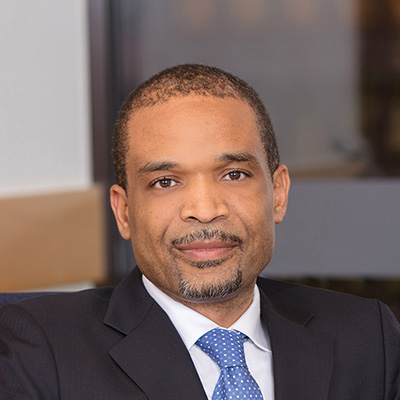This series features interviews with Black dealmakers and trailblazers in the private equity (PE) and finance community. To help us spotlight professionals making a difference in their career pathways, please email Greg Kilpatrick at gkilpatrick@mcguirewoods.com or Gerald Thomas at gthomas@mcguirewoods.com

Q: Why is it important for more Black professionals to pursue careers in PE?
Akan Oton: PE-backed companies have become a huge driver of economic activity in the United States and help shape economic opportunity in the communities in which these companies operate. Having broader representation of people of color within the PE community and active participants in the capital allocation process helps ensure economic opportunity is shared.
Q: What do diversity, equity and inclusion (DEI) mean to you, and why are they important?
AO: DEI covers a myriad of items. It’s more than just having equal representation in your organization from a race, cultural, gender, age and sexual orientation standpoint. It’s also about diversity of experiences and thinking. We only get halfway there when looking at DEI by the numbers, although the numbers are a necessary predicate to what we really want, which is this rich environment where the best ideas and decisions are made.
We can only appropriately represent the interests of our investors, who increasingly have distinct needs and investment objectives, by accounting for diversity. While some investors may still be interested only in pursuing returns, other investors have additional considerations at the center of their mandates when they provide us with capital.
To elaborate further, at its core, our job is to serve our investors who have specific objectives, but we don’t need to trade return for societal benefits.
This goes back to why it’s a positive for more people of color to be in this industry. There’s often a distinct sensitivity and recognition of the societal benefits that can come with a particular investment decision.
At the end of the day, if a company is managed appropriately, it is likely already considering and wrestling with the issues of diversity. These issues are important for doing good by customers and communities while also doing good financially. We’re going to focus more on companies that are doing the right things because that’s good corporate governance when we evaluate them and make investment decisions.
When you see a company that is not having a positive influence on these issues, you tend to shy away as an investor because that speaks to the quality of the management team and a likely lack of thinking about and acting upon these issues. It may speak to a lack of capability and nuanced understanding amongst the management team.
Q: What is your approach to understanding the perspectives of colleagues from different backgrounds?
AO: To understand different perspectives, you must be an active listener, deliberately staff teams diversely and foster a “speak up” culture. By speak up, I don’t mean performative discussions in town halls or at team meetings. I instead mean genuine, one-on-one discussions where you make folks comfortable to share and actively discuss their perspectives on issues. I find it’s easier for colleagues to express differences in one-on-one meetings and safe settings.
Q: What do you think is the biggest challenge facing Black entrepreneurs? What advice would you provide to overcome it?
AO: Access to capital and raising startup capital are the biggest challenges facing Black, and frankly, all minority entrepreneurs. While the economic base of our community has improved in the past 15 years, it certainly isn’t akin to the level within the majority community. The typical “friends and family” seed investment can be difficult.
My advice to budding entrepreneurs: First, develop a strong track record. You don’t need to be a CEO but try to be part of an entrepreneurial team that can provide you with some “startup credibility” and this track record. Second, build strong networks and participate in as many entrepreneurship groups as possible to learn how others have done it. Third, be broad in your outreach for capital.
Q: What is something few people know about you?
AO: I’m a frustrated novelist. I’ve been working on two novels for the better part of eight years. My next career will be as a writer. It’s something I’m passionate about that I need to find the time, or maybe discipline, to do more.
About Akan Oton
Akan Oton is a member of the Barings capital solutions team and leads the team’s investment strategy in healthcare. Oton joined the firm in 2017 and has worked in the industry since 1998, bringing more than 24 years of experience. At Barings, Oton has led the growth of the team’s investment capabilities in pharmaceutical royalties and non-dilutive healthcare finance.
Prior to joining the firm, Oton worked at Sandoz (a division of Novartis), where he was an executive director and responsible for product acquisition and licensing and led M&A initiatives in generics and specialty brand segments. Prior to Sandoz, Oton worked at Catalent Pharma Solutions, where he was responsible for product partnering and technology licensing for the company’s venture group. He has also held marketing leadership roles at Cardinal Health and Johnson & Johnson.
Oton holds a B.S. in mechanical engineering from Columbia University; an M.S. in mechanical engineering from Massachusetts Institute of Technology, where he was a National Science Foundation Graduate Fellow; and an MBA from The Wharton School at the University of Pennsylvania. He is also a certified licensing professional and a board member of the New Jersey chapter of the Licensing Executive Society.